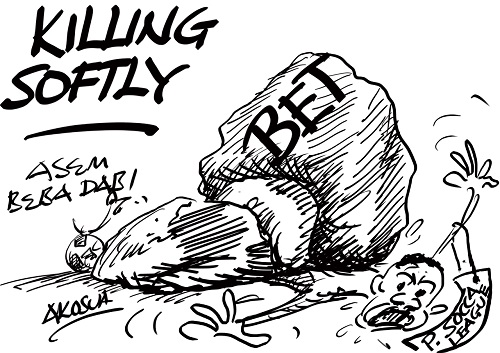
Yesterday, we carried another sad story about the gruesome murder of a 67-year-old woman at Tindongo in the Upper East Region, Madam Yenboka Keena. According to the story, which happened the same day Captain Maxwell Mahama was murdered at Denkyira Obuasi, the late Yenboka Keena was accused of being a witch.
The people who made the allegation against the old woman reportedly took her to the Pelungu Chief, who has traditional supervisory role over Tindongo. The Chief reportedly told the people who brought the woman to his palace that he could not handle the matter, because there was no evidence that the woman had bewitched anyone.
After washing off his hands off the case, and also confirming that there was no evidence to nail the woman on the allegation the people had leveled against her, one would have expected the Chief to warn the people to leave Keena alone. But, this never happened, rather the Pelungu Chief called his subordinate at Tindongo, where the victim hails from, and asked him to handle the case he had earlier refused to adjudicate - because there was no evidence.
But, before the Tindongo Chief could come into the equation, the people accusing the woman of being a witch had already gone for her from her family house and stoned her to death. The Chronicle, as a newspaper house, does not intend to undermine the culture and traditions of any tribe in Ghana, but we are worried about the way old women are being treated in the northern parts of the country. We are saying so, because it is the only place that has a camp where women accused of being witches are housed. They have completely been alienated from the larger society.
Meanwhile, The Chronicle is yet to identify any well-educated woman who has found her way to the Witches Camp because she is a witch. In most of the cases, it is our poor old women who have no formal education that are treated in such inhumane manner.
When one is accused of being a witch, there is no way that person can use the legal system to prove his or her innocence, because the issue borders on spirituality, and our legal jurisprudence does not recognise spiritual matters.
It is based on this that some of our traditional leaders have taken it upon themselves to adjudicate in such cases. Knowing the penchant for accusing women of being witches in that part of the country, the Pelungu Chief ought to have known better and detained the lady in his palace for some time before releasing her.
In most of the rural settlements in Ghana, the chief's palace is always the sanctuary for the people. Regrettably, poor Keena did not get any succor from her chief, and was murdered in such a callous manner.
Though The Chronicle is unhappy with the speed at which the police released the body to the family for burial, it is our hope and prayers that those who took part in the dastardly act would be arrested to face the full rigours of the law.
This will serve as a deterrent to others who may want to attack another woman in future, on the same flimsy excuse of her being a witch. The fact that the late Keena was poor, and also coming from a poor home, should not be an incentive for the police to treat her case lightly. Even though she is dead, her soul expects justice from the living.
Read Full Story





















Facebook
Twitter
Pinterest
Instagram
Google+
YouTube
LinkedIn
RSS